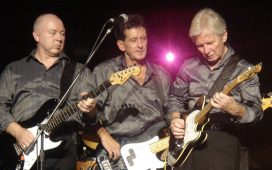Before taking flight as indie-rock heartbreakers the Wrens, Kevin Whelan and Charles Bissell were an awkward, prickly pair who met at a graduation party in an abandoned house. “I never had any friends or girlfriends,” the affable Whelan, 51, says with a self-effacing laugh from the New Jersey home he shares with his wife and sons. “My Saturday night was watching Doctor Who on PBS.”
Whelan’s frontman confidence was still a work-in-progress in 1988, so Bissell, a guitar whiz and jazz fiend six years his senior, took him under his wing, lending the nerdy keyboardist an amp to join the party jam. Before long Whelan was paying visits to Bissell’s New York apartment, where he heard his future bandmate debut his first song. “I can even remember it,” says Whelan, grabbing an acoustic guitar to recite his friend’s 33-year-old riff. “From that, we started really getting into what songs could be.”
In Whelan and Bissell’s ensuing decades as the Wrens – up to and including the revelation this year of a bitter schism – the beloved band’s perfectionism and obstinacy made them underground martyrs. In a post-grunge era when majors coveted scrappy underdogs, the Wrens snubbed the Flaming Lips’ manager, alienated a DreamWorks A&R (later to sign Elliott Smith) and rejected a seven-figure deal with the music retail multimillionaire Alan Meltzer, who shrugged and made Creed rich instead. Having blown a last-ditch trial with Interscope, they resigned themselves to obscurity, toiling away on a farewell album for what remained of their fanbase.
After seven years of label drama, disappointment and meticulous tinkering, the Wrens released that third album in 2003. Though played at the pitch of teen anguish, The Meadowlands swapped punk fervour for cobwebbed curios about thwarted dreams and the romantic, perilous pursuit of adolescent ideals into your mid-30s. Whelan bellowed breakup anthems and midlife pep talks. Bissell crammed funny details and dialogue into novelistic scenes (“Where’s Ann been? She pours herself a don’t-ask gin”). Critics swooned.
As the years passed, fans bestowed the album with a mythic status akin to My Bloody Valentine’s Loveless. A follow-up was imminent, the band promised – first in 2007, then more or less annually for the next 14 years; it has never been released.
If The Meadowlands spun beauty from disenchantment with idealism, then Observatory, Whelan’s solo debut as Aeon Station, spins beauty from disenchantment with the Wrens. He spent much of the last decade sitting on his half of a Meadowlands follow-up that Bissell inadvertently thwarted, trapped in recursive fine-tuning. That’s Whelan’s story, anyway – the pragmatist foiled by the quixotic perfectionist – some of which his former friend dismisses as “press points and nonsense” when I speak to him separately.
Although Whelan plays most of the instruments in Aeon Station, his Wrens bandmates – guitarist brother Greg Whelan and drummer Jerry MacDonald – play on alongside him. Observatory revisits the Wrens’ pet topic: how to cling to faded hopes while negotiating with adult life. This time, though, the context is pointed. Whelan says the name reflects the aeons-long wait to release his music. On the cover, a half-built office block signifies that “projects sometimes just don’t get finished”.
Whelan threads these motifs into tender writing about raising his neurodivergent son. “He’s blessed, the way he looks [at things], but the reality is that he’s not complete in that way,” he says. “That same theme kept coming over: you look to achieve something and you’re just shy of it all the time. But is there beauty in that?”
The Wrens, too, romanticised their near-misses, Whelan admits. “Other bands that we saw go be successful, whether it was Bright Eyes or Arcade Fire, always said yes. They would say yes to fucking anything. Their DIY side was in better check than ours.”

The Wrens formed in 1989, when the band moved into a cramped New Jersey house, scrambling together two albums of alt-rock ephemera. After The Meadowlands, work on what was supposed to be their fourth album began around 2007. MacDonald and Greg had moved out, leaving Bissell and Whelan, then 36 and 42, alone together after 15 years. Determined to move forward, Whelan went on hiatus from his girlfriend and rattled off 100 demos. Then he moved out and got on with his life: married, had children and began climbing towards his current day job as a Johnson & Johnson executive.
When the Wrens signed to Sub Pop in 2014, Bissell, who had also married and had children, posted on Facebook that the Meadowlands follow-up was complete. But he cautioned fans to temper expectations. “My best years and work are clearly behind me,” he wrote. “Which is sad, because I’ve pretty much burned every available moment of the last four years at least doing this.”
The post rankled Whelan, and during the subsequent fallout, the album slid back into purgatory. “That moment was exponentially low and bad,” Whelan says. “You’re gonna bring people on the journey like you’re Kim Kardashian? It’s repulsive to me. We can throw it in the garbage and start again, but we don’t need to tell the Joneses.” Whelan says his songs have sat untouched since that 2014 episode – and this is where his and Bissell’s stories splinter.
In a series of wounded, footnoted emails that read like exposition from an epic postmodern novel, Bissell contends he logged “hundreds of hours” on the Observatory singles, conceiving arrangements and composing guitar lines that either remain intact or were rerecorded, uncredited (his sole credits are as an engineer).
“His story is that I worked on the album for too long, but that simultaneously somehow I also had nothing to do with [the Aeon Station] songs,” Bissell writes, in a 4,000-word statement that he intends to make public. “I suddenly found myself being portrayed as often as not as the baddie, as if I had somehow held him back, intentionally or at least thoughtlessly and selfishly even, which I’ve gotta say, was really confusing and weird.”
To illustrate his input, Bissell sends a segment of the Observatory single Queens in its tinkered-with phase: a Wrens track called Sophie. The Aeon Station record, to be clear, is wonderfully rendered: anthemic without being over-polished. But I have to admit that my stomach somersaults upon hearing this mothballed labour of love. With just a few Bissellian flourishes – eerie harmony, close-miked guitar filigree – there’s an uncanny transformation to the song: this is the Wrens, with all their atticky magic.
For his part, Whelan thinks the magic came at too great a cost. With his half of the album purportedly finished by 2014, he and the band paused when Bissell was diagnosed with a plasma cell cancer in 2015 (he has recovered, and recently ran a half-marathon with his wife). But early last year, formal calls between members began to resurface tensions.
Whelan characterises the talks primarily as pleas to Bissell to release the album. Bissell says he just wanted more recognition for his creative and business roles. Did that include money? Whelan suggests as much. Bissell denies it.
Far from holding the Wrens hostage, Bissell says he approved the “final” album in 2019 pending just a handful of tweaks – at which point, crucially, Whelan was proposing just as many. (“That’s not true,” says Whelan.) Bissell’s most alarming claim, which Whelan again rejects, is that Whelan was requesting production edits even while secretly readying Aeon Station for Sub Pop. Each of them claims to have presented pathways to a Wrens release that the other ignored.
When talks collapsed, Bissell called Sub Pop to apologise for wasting their time on a band of “fiftysomething white men” that had just imploded. The label’s somewhat miffed response, Bissell says, was that they already had a release date for Whelan’s solo record. “If this was an early-aughts indie film,” Bissell writes, “the camera would’ve done that telescoping dolly zoom thing to show the character’s world inverting.” Bissell and Whelan have not spoken since.
Whelan says he gave ample warning about the split, including a February 2021 deadline. “Ultimatum is sometimes seen as a bad word, but if you waited from 2007 until 2021, I think you were pretty generous,” he says. On the matter of credit, he adds: “If you hire someone to paint your walls and it takes 10 years, how should you pay him?”
After a 17-year stretch that yielded just six completed songs, Whelan wrote and recorded four more in late 2020. He tackles the conflict with Bissell on veiled confessionals like Everything at Once, which weaves Wrens backstory into a spangled, heartrending kiss-off. The saddest insight into the band’s disintegration, Alpine Drive, had improbably been set for the Wrens record. “One thousand night shifts all end with the sun / Still breaking rocks into songs we never get done,” Whelan sings. “Where are the memories to the plans that we made?”
Bissell, convinced of a calculated betrayal, rules out the prospect of a reunion, and plans to release his own solo album next year. Whelan says he hopes for an eventual return to the band’s punk-rock roots, with “just four of us standing in a basement”.
But their views on who abandoned whom cannot, for now, be reconciled. “I let my dreams sit on the bottom shelf for a long time,” Whelan says. “It’s a betrayal that I let a decade of my life go by and did nothing.”













